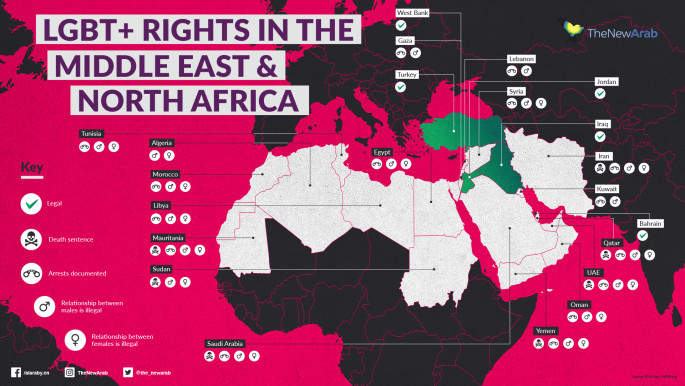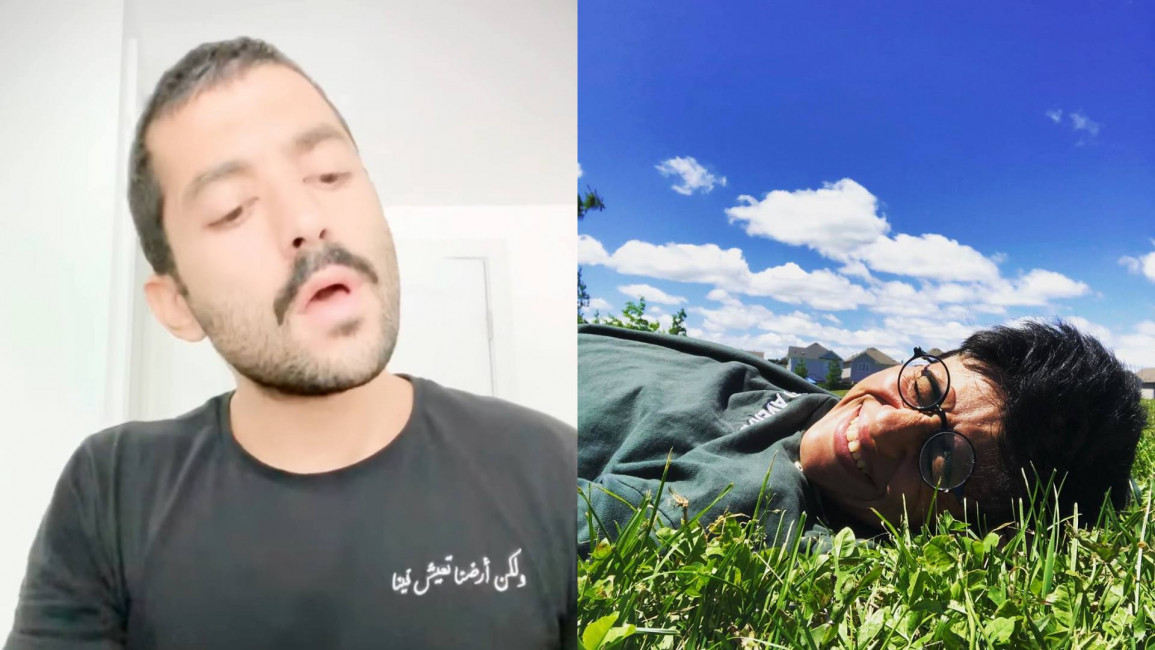Mashrou Leila's Hamed Sinno sings moving tribute to late Egyptian gay activist
Mashrou Leila's Hamed Sinno sings moving tribute to late Egyptian gay activist
The openly gay frontman of Lebanese alternative band Mashrou Leila has voiced his support for Sarah Hegazi, the Egyptian LGBTQ+ activist who died by suicide last week.
4 min read
Mashrou Leila has also faced hate campaigns over its support for progressive causes [Instagram]
The frontman of popular Lebanese alternative band Mashrou Leila has paid tribute to a persecuted Egyptian gay activist by transforming her last Instagram post into a moving song.
Hamed Sinno released the musical homage to Sarah Hegazi on his Instagram story on Monday.
Hegazi died by suicide last week, three years after she was arrested and tortured for flying the LGBTQ+ Pride flag during a Mashrou Leila concert in Cairo.
Sinno took the caption of Hegazi's last Instagram post, which accompanied a photo of the activist lying in a patch of grass and smiling, and transformed it into a moving vocal solo accompanied by the piano.
"The sky is sweeter than the earth!" Hegazi had written on Saturday. "And I need the sky, not the earth."
In a Facebook post on Monday, Sinno asserted that the trauma faced by minority communities is often reflected in higher death rates from both mental and physical ailments.
"That is what trauma does to the body. That is what hate does to the body. The thought that someone can leave a society that keeps trying to kill them, and still carry that society inside them, still be moved to taking their own lives, chills me to the bone, as I reflect on my own exile, and the exile of the people I love," the New York-based singer-songwriter wrote.
"We spend the first part of our lives demanding air in our homelands, and then we leave to countries where we are promised air, only to find out we were robbed of lungs."
|
|
"I honestly thought they'd understand that I was human. That we were human. I got away with it for long enough that I started to believe my own optimism, and so did others, and they suffered for it. Her blood is on my hands as much as it is on yours. It should have been me in that prison cell," he wrote.
"I apologise if I gave anyone hope that they'll one day see us as human. The truth is, they've always known we're human. That's why they pretend to be doing God's bidding when they kill us."
The Lebanese band has faced controversy over its support for LGBTQ+ rights and other progressive - but taboo - issues.
Since 2016, Mashrou Leila has faced an effective ban on performing in Jordan, where officials described the band's songs as containing "lyrics that do not comply with the nature of Jordanian society".
Controversy around the band has intensified in recent years, with last year seeing the organisers of Lebanon's largest international festival cancelling a Mashrou Leila show amid a fierce homophobic campaign from local Maronite leaders.
'Declaring' herself to society
Hegazi, who identified as a gay woman, was among several attendees who unfurled LGBTQ+ Pride flags during the band's 2017 concert in Cairo.
Dozens of people were arrested over the incident but Hegazi, then 28, and student Ahmed Alaa, then 22, faced the most serious charges in Egypt's most serious crackdown against the LGBTQ+ community in recent years.
They were both charged with "joining an illegal group and promoting its ideas". The additional charge of "promoting sexual deviancy and debauchery" was specifically leveled against Hegazi.
 |
| [Click to enlarge] |
Hegazi said she faced sexual harassment, assault and torture over the course of the ordeal before fleeing to Canada, where she was later granted asylum. Alaa was also granted asylum in Canada.
After her release on bail, Hegazi was diagnosed with severe depression and told NPR she suffered from a "very intense, serious case" of post-traumatic stress disorder (PTSD). She said she has experienced hallucinations of "people who are nice, who discuss things and don't attack" her.
Her decision to fly the Pride flag in conservative Egypt was "an act of support and solidarity - not only with the [Mashrou Leila] vocalist but for everyone who is oppressed", Hegazi told NPR.
"I did it because of my sexuality," she told Deutsche Welle. "I was declaring myself in a society which hates all that is different from the norm."
Before her tragic passing, Hegazi allegedly left a note that read: "To my siblings, I have tried to find salvation and I failed, forgive me. To my friends, the journey was cruel and I am too weak to resist, forgive me. To the world, you were cruel to a great extent, but I forgive you."
Egypt does not explicitly criminalise sexual or gender identities, but has repeatedly persecuted its LGBTQ+ community under vague morality laws.
Authorities have used tactics widely concemned by human rights groups, such as arbitrary arrests, forced anal examinations and sting operations on gay dating applications.
Follow us on Facebook, Twitter and Instagram to stay connected



